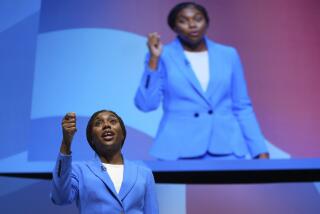Fight to Succeed Thatcher Begins : Britain: All three candidates cling to essence of Thatcherism but try for more compassionate look.
- Share via
LONDON — The contest to replace Margaret Thatcher as Britain’s prime minister began quietly today, with all three candidates espousing elements of her right-wing policies while trying to present a more compassionate look.
All three said they would maintain much of the essence of Thatcherism--careful monetary policies, shifting responsibility from the state to individuals and keeping Britain at the heart of decisions on European union without surrendering sovereignty.
But after a decade of Thatcher’s radical, uncompromising style, which alienated many Britons, each challenger sought to present a more caring face. Thatcher submitted her resignation Thursday.
Chancellor of the Exchequer John Major, 47, standard-bearer of the Conservative Party’s emerging generation of young technocrats, appeared to be garnering support from many of the gut Thatcherite loyalists and the right wing.
Foreign Secretary Douglas Hurd, 60, portrays himself as a healer of the party’s wounds of division and the safe pair of hands needed in a time of potential war in the Persian Gulf.
Michael Heseltine, 57, whose maverick challenge unseated Thatcher this week, has played himself as the man of the 1990s, unafraid to push forward radical policies in the Thatcher mold but in a less abrasive style.
The 372 Conservative members of Parliament will vote Tuesday to decide who leads the party and automatically takes over as prime minister. Commentators agreed that it is too soon to predict who will win.
If no candidate gets a clear majority of 187 votes, another ballot will be taken Thursday in which second preference votes will be counted.
Aides of Heseltine, who had stalked Thatcher for four years since resigning in anger from her Cabinet as defense minister, estimated his current support at more than 190.
“The young people who have supported Mrs. Thatcher so loyally have now begun to listen to what I’m saying . . . and realizing that actually I’m a radical reforming Tory wanting to push on the frontiers in the 1990s,” he said in a television interview.
Neither Hurd nor Major was prepared to predict his own standing, although each said he is determined to win.
At a news conference, Major exuded the cool self-confidence he has used in recent weeks to portray economic recession as just a necessary step in the fight against inflation.
A circus performer’s son who left school at 16 and tasted the frustrations of unemployment, Major promised to make Britain a “truly classless society,” building on the “increase in social mobility” of the last decade.
Hurd, who won a scholarship to the exclusive Eton school and who had a career as a diplomat before entering politics, said his style would be to “listen, decide, persuade.”
* Londoners have an air of disbelief and celebration. See P2
More to Read
Sign up for Essential California
The most important California stories and recommendations in your inbox every morning.
You may occasionally receive promotional content from the Los Angeles Times.













